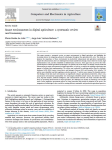Avila F.R. de, Barbosa J.L.V. (2025). Smart environments in digital agriculture: a systematic review and taxonomy. Computers and Electronics in Agriculture, 01/09/2025, vol. 236, p. 110393.
https://doi.org/10.1016/j.compag.2025.110393
https://doi.org/10.1016/j.compag.2025.110393
| Titre : | Smart environments in digital agriculture: a systematic review and taxonomy (2025) |
| Auteurs : | F.R. de Avila ; J.L.V. Barbosa |
| Type de document : | Article |
| Dans : | Computers and Electronics in Agriculture (vol. 236, September 2025) |
| Article en page(s) : | p. 110393 |
| Langues : | Anglais |
| Langues du résumé : | Anglais |
| Catégories : |
Catégories principales 06 - AGRICULTURE. FORÊTS. PÊCHES ; 6.4 - Production Agricole. Système de ProductionThésaurus IAMM AGRICULTURE NUMERIQUE ; SYSTEME DE PRODUCTION ; NOUVELLE TECHNOLOGIE |
| Résumé : | This paper presents a systematic review on smart environments in digital agriculture and highlights the increasing interest in integrating advanced technologies throughout the agricultural life cycle. The study emphasizes the importance of these environments in productivity enhancement and agriculture sustainability. Despite the advancements, there are challenges that remain unaddressed, though. Issues related to security, high implementation costs, and the availability of skilled human resources. These gaps seem to prevent the widespread adoption of smart agricultural technologies. The primary aim of this study is to identify current trends and advancements in smart environments for digital agriculture, as well as, to analyze the enabling technologies that appear to facilitate their implementation. The review was conducted by analyzing articles from five academic databases (ACM, IEEE, Scopus, ScienceDirect, and Springer), between 2019 and December 2024. Initially, 758 articles were identified, and after applying a selection protocol, 71 articles were retained for detailed analysis. The findings reveal that smart environments can significantly enhance agricultural productivity, reduce costs, and promote environmental sustainability. Key technologies identified include sensors, the Internet of Things (IoT), big data analytics, artificial intelligence, and communication networks. The study concludes that while there are promising advancements in smart agriculture, the challenges rely mostly on technology costs and the need of more supportive government policies to foster innovation and nourish its adoption in the sector. The integration of technologies is also crucial for creating efficient, sustainable, and productive agricultural practices. |
| Cote : | Réservé lecteur CIHEAM |
| URL / DOI : | https://doi.org/10.1016/j.compag.2025.110393 |







